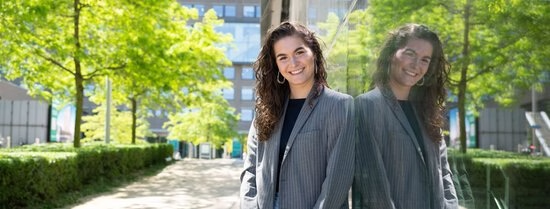The study programme in a nutshell
Curriculum
The Health Psychology Master's will provide you with the relevant theoretical expertise and the skills necessary to work effectively in the field. The curriculum consists of four core courses:
- The first core course focuses on theories of health psychology and behaviour change and the process of understanding and analysing targeted behaviour.
- The second core course considers the role of communities and broader social systems in relation to health and well-being and teaches how to co-create with societal stakeholders to address societal challenges.
- The third core course dives into the world of digital behavioural health and how to design, implement, and evaluate digital interventions.
- The fourth core course focuses on acquiring key professional and research skills in behaviour change.
The curriculum includes the option to complete one or two electives, choosing from various courses covering methodological skills (such as qualitative research methods or advanced statistics) and complementary theoretical knowledge (such as leadership and coaching).
All teaching activities are taught in English, including the lectures, study manuals, examinations, and literature.
Internship to apply your knowledge
In the second semester, you will complete a practical, professional internship and a research internship leading to your final thesis. Both can be carried out either in external organisations and companies working in healthcare and health promotion, policy making, behaviour change and/or e-health, or in the research areas of our faculty. The internships can also be combined into a longer one, where both practical experience and research work can be integrated into a larger project.
By completing these internships, you will have the opportunity to practice the skills and competencies acquired in the first semester and gather professional and research experience in the field. You will have the chance to experience the work of a health psychologist and behaviour change specialist in real-life settings, creating the basis for entering the job market.
Our internship network includes public and private organisations offering exciting and relevant internship positions to our students across various topics and domains, such as public health promotion (at the local or national level), sustainability, digital health and well-being, policy development and implementation, etc. Examples of organisations include the municipality of Rotterdam, the GGD (local public health services), research organisations (consultancy firms, national and international research consortia), e-health providers, software and start-up companies working in digital behaviour change. An internship abroad is also possible in an organisation relevant to the contents of the master's programme.
The educational programme is subject to change. No rights can be derived from the information below.
Testimonials
The Health Psychology master's employs a mix of educational methods, including traditional lectures, problem-based learning, and project assignments based on real-life cases, to be carried out independently or in small groups. The teaching team will introduce many examples from their own work and experience with bringing about societal change, such as community actions to improve the health of Rotterdam citizens (www.healthyr.nl). Another example is the development of the student well-being app ROOM to grow.
Our educational approach is student-centred: students play an active role in their learning process. They are given ample opportunities to influence their learning process (e.g., by choosing interesting cases). We do not solely focus on lecturing to accomplish information transfer (as is the case in traditional educational systems), but instead promote active participation of the students in small groups. Most of the time, it is not the teacher explaining, but the students themselves, leading to deeper learning and learning by doing.
This programme includes plenary lectures and workgroups where students work together to address real-life problems, tapping into multidisciplinary subjects. These are open-ended problems with multiple solutions, simulating a real-life professional situation. Students will have to search for information that they will discuss with their group and work out a concrete solution. The students use their knowledge and skills to acquire new knowledge and refine their competencies.
On average, there are 12 contact hours per week. This time is distributed over lectures, workshops and individual office hours with the course coordinators. Students spend a large part of their time on personal study and projects/assignments, which can be done individually or in groups. Most students spend approximately 40 hours per week on their studies.
Curriculum
The curriculum of this Master's programme consists of 20 EC core courses (four courses of 5 EC), the Master's thesis (minimum 20 EC) and an elective component of 20 EC. The elective component can be filled with a combination of elective courses (each 5 EC), a practical internship (10 EC, 15 EC or 20 EC) and a longer Master's thesis (30 EC instead of 20 EC).
